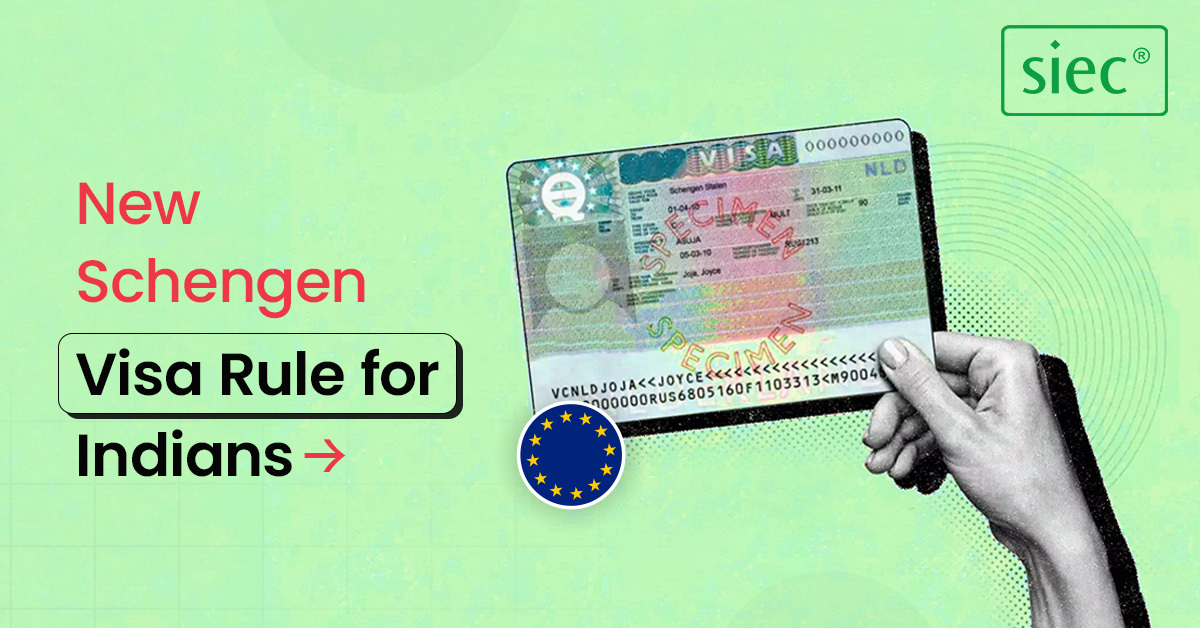
Updated On: 28 October 2025
New Schengen Visa Rules for Indians
Planning a trip to Europe this summer? Here's some exciting news for you. The European Union has introduced new Schengen visa rules for Indians that are more favourable for Indian travellers. Now, you can apply for five-year multiple-entry visas, which puts you on par with "visa-free nationals". This means that, like citizens of certain countries who can enter the Schengen area without a visa, you can now enter multiple times over five years without applying for a new visa each time. This significant development simplifies the visa process and strengthens the regional bonds between India and the EU, as acknowledged by Herve Delphin, the EU's ambassador to India. This new system empowers you to plan your trips more flexibly and with less hassle, making your travel experience more enjoyable. The New Schengen Visa Rule for Indians has clearly confirmed that the European Union has eases the rules for Schengen Visa for Indian citizens at the most.
Read More: 10 Tips to navigate Health emergencies when Studying Abroad
New Schengen Visa Rule for Indians: EU eases Schengen visa rules for Indians
|
Schengen visa Highlights |
|
The "Cascade" system allows Indian citizens to get two-year multi-entry Schengen visas after using two visas within three years.
|
New Schengen Visa Rule for Indians: What does the rule change mean for Indians?
"Recently, the European Commission adopted specific rules on the issuance of multiple entry visas to Indian nationals, which are more attractive than the previous regulations," said Vipul Jai, Partner at PSL Advocates & Solicitors.
The revised regulations, known as the "Cascade" regime, allow Indian nationals to obtain long-term, multi-entry Schengen visas valid for two years after using two visas within the past three years. This means that if you have used two visas in the past three years, you can now apply for a two-year visa, and if you continue to meet the criteria, you can apply for a five-year visa. This new Schengen Visa rules for Indians simplifies the visa process and offers more flexibility to frequent travellers. "The two-year visa will normally be followed by a five-year visa, provided the passport remains valid," Vipul noted. Holders of these visas will enjoy travel rights similar to those of visa-free nationals during the visa's validity.
Previously, Indian travellers had different visa types tailored to short or long stays, depending on their travel purpose.
See Also: Top 10 European countries for International students to study in 2024
New Schengen Visa Rule for Indians: Centralization of visa processing
One of the most empowering changes is the centralization of visa processing, as explained by Punyam Bhutani, Associate at SKV Law Offices. This shift allows for more flexible processing of short-term visa applications across various Visa Application Centres operated by VFS Global in India, of the applicant's residence. This means you have more control over when and where to apply for your visa, making the process more convenient. More importantly, the centralisation of the new Schengen Visa rules for Indians ensures a more efficient and streamlined process, giving you the confidence that your visa will be processed promptly. With this new system, you can rest assured that your visa application is in good hands, allowing you to focus on planning your trip.
"Previously, applicants had to book appointments and submit applications based on their local jurisdiction, which could limit their options and convenience. However, this relaxation does not extend to applications for national visas, such as for students, employment, or family reunion visas," Punyam added.
Moreover, the EU is progressing towards digitalizing the Schengen visa application process. This includes online applications and digital visas, allowing applicants to submit their applications and receive their visas electronically. This shift is aimed at streamlining the process and enhancing security. The full implementation of these digital measures is anticipated to improve both the efficiency and security of the visa process. With this new system, which has introduced centralisation and new Schengen visa rules for Indians, you can apply for your visa from the comfort of your home, track the status of your application online, and receive your visa electronically, eliminating the need for physical documents and reducing the processing time.
You might also like: Schengen countries with the lowest visa rejection rate
New Schengen Visa Rule for Indians: Cost of Schengen visa
"As of 2024, the Schengen visa costs approximately Rs 7,200 for adults and Rs 3,600 for minors," said Vipul Jai, Partner at PSL Advocates & Solicitors. He added that there is a proposal to increase the basic fee to Rs 8,000 for adults and Rs 4,000 for minors, reflecting an adjustment for inflation. This proposed change is pending approval and will be effective shortly after endorsement. However, it's important to note that children under six remain exempt from the visa fee, which can significantly relieve families planning their trips. This clear information about the visa cost allows you to plan your budget more effectively, ensuring a smooth and worry-free trip.
"An additional fee may apply if the applicant uses visa service centres, which collect applications on behalf of consulates in some cases" Vipul noted.
"The Schengen visa fee is non-refundable, regardless of the application outcome" commented Punyam Bhutani, Associate at SKV Law Offices. Travellers should consider these costs when planning their visa applications.
See this also: Apply for a Schengen visa
How much time does it take for a Schengen visa to be processed?
The processing time for a Schengen visa varies and is influenced by factors such as the applicant's nationality, the consulate's workload, and the time of year. Typically, it takes about 15 calendar days for Indian passport holders. However, during peak travel periods or if further investigation is needed, processing can extend to 30-60 days. With recent relaxations in visa rules, processing times may be reduced, potentially speeding up visa acquisition for Indian travellers. It's important to note that these are general guidelines, and individual cases may vary.
Applicants can submit their visa applications six months before their intended travel date.
Which countries come under the Schengen area?
The Schengen area comprises 29 European countries, including 25 EU states: Belgium, Bulgaria, Croatia, Czech Republic, Denmark, Germany, Estonia, Greece, Spain, France, Italy, Latvia, Lithuania, Luxembourg, Hungary, Malta, Netherlands, Austria, Poland, Portugal, Romania, Slovenia, Slovakia, Finland, and Sweden, along with non-EU members Iceland, Liechtenstein, Norway, and Switzerland.
You may like: Overcome Language Barriers while Studying Abroad
Conclusion
Reach out to SIEC for Application inquiries and assistance.
Read more insightful articles:
Study and work opportunities within and beyond Europe
Germany as the top destination for Indian Students



Comments (0)
Leave a Comment